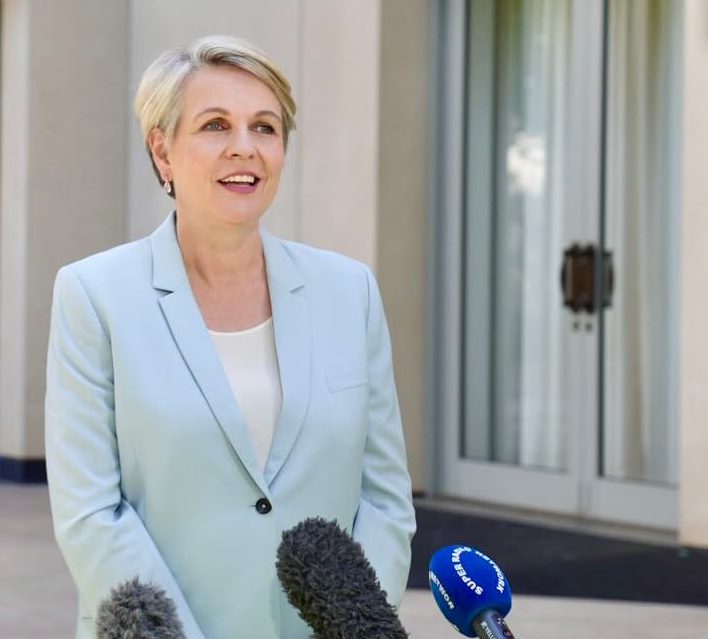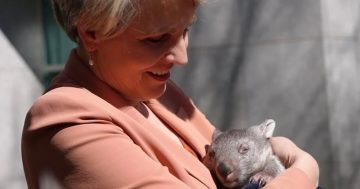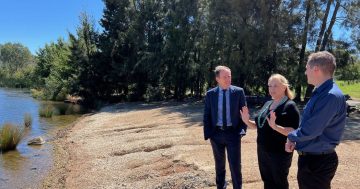
Tanya Plibersek: “We’re also working to support faster, clearer decisions for business. That greater certainty for business will help drive investment in nation-building projects.” Photo: Tanya Plibersek.
Environment Minister Tanya Plibersek has outlined further plans for an independent national environment watchdog, saying she will introduce legislation in the next few weeks.
But the planned overhaul of national environment laws has been deferred.
The Minister unveiled the second stage of the Federal Government’s Nature Positive Plan, which she insists will better protect the environment while giving more certainty to the business sector and supporting “sensible development”.
However, there was scant detail about when the touted fix of the Environment Protection and Biodiversity Conservation Act, as recommended by the Samuels Review, will get underway and when national environmental standards will kick in.
Massive fines of up to $780 million or jail terms of up to seven years will, however, be in place to deter intentional and serious offenders against the nation’s environmental laws.
The national Environment Protection Agency, with strong new powers and oversights of penalties, will be set up to enforce environment laws.
The independent body will be given powers to audit business compliance with the law, particularly regarding development approvals, issue fines and/or stop-work notices.
Another component of the legislation will be the establishment of a new body called Environment Information Australia, which will provide more accountability and transparency and easier access to the latest environmental data.
It will release State of the Environment reports every two years and report on progress on national environmental goals.
A $100 million investment, including on renewables and critical minerals, will be geared towards racing faster environmental approval decisions on projects.
“We’re delivering stronger protections for the environment, including Australia’s first ever independent national Environment Protection Agency,” Ms Plibersek said.
“We’re also working to support faster, clearer decisions for business. That greater certainty for business will help drive investment in nation-building projects.
“When I first announced the Nature Positive Plan, I said it would require cooperation, compromise and common sense to deliver.
“That’s exactly how we’re approaching the rollout.”
However, former ACCC chair Graeme Samuel’s 2020 review of the EPBC Act, which recommended introducing national environmental standards as a matter of urgency, has not yet been fully acted on.
The collection and sharing of data is more the focus of the latest move.
The government has ambitions to protect 30 per cent of Australia’s land and 30 per cent of its oceans by 2030.
The Minister says Environment Information Australia will collect data on progress towards those goals and make it publicly available.
“It will also make information available to proponents who are trying to do a new project somewhere, to give them environmental data so they can better design that project to avoid sensitive areas, to avoid threatened species habitat,” Ms Plibersek said.
The Australian Greens have accused the government of dumping the already overdue environmental reform package “in a capitulation to polluters, the fossil fuel lobby and logging corporations”.
Greens environment spokesperson Sarah Hanson-Young is chairing a Senate inquiry into environmental laws.
“This is a broken promise that sells-out our environment and the millions of Australians who want faster climate action,” Senator Hanson-Young said.
“The government has dumped their election promise to reform Australia’s environment laws and instead rolled over for the fossil fuel industry, which wants faster and easier approvals for polluting and damaging new coal and gas projects.
“Caving into the miners, loggers and big polluters will only leave our environment vulnerable to further destruction … The government’s scaled-back ‘nature positive’ plan does nothing to address these threats and halt extinctions.
“An environment protection agency without teeth is not a substitute for the powerful watchdog experts have called for … while more environmental data and offsets auditing is welcome, this is not reform. This is something Australians expect the government should already be doing.”
The Biodiversity Council described the announcement as a “significant step back” from what the government committed to in its nature-positive plan.
Ms Plibersek has stressed that the first tranche of the new laws was introduced in December last year.
That was establishing the Nature Repair Market and broadening the water protections that mining projects might impact.
“This is the second stage of our laws – and as Professor Graeme Samuel’s made very clear, he thinks it’s very sensible to proceed in this staged way,” she told ABC Radio.
“We’re doing a massive consultation on our new laws. The current Act is around 1000 pages. The legislation that replaces it will be similar.
“It’s big, and it’s complex, and we’re going as fast as we can while still talking to environment groups, business groups and the broader Australian community.
“You can see the direction we’re taking. We’ve released our Nature Positive Plan and conducted hundreds of hours of consultation with over 100 groups.
“Thousands of people have participated in online webinars to give their feedback on the new laws. It’s big and complex, and we’ll go as fast as we can.”



















